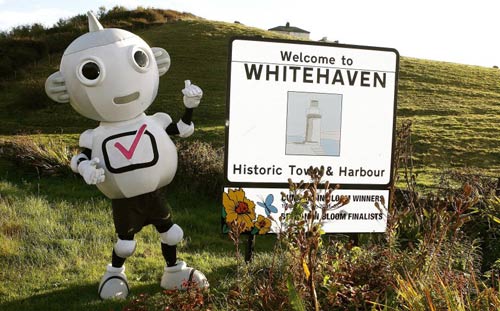The digital TV revolution is nearly here. But are you switched on yet?
With the plug soon to be pulled on the analogue signal in parts of the UK, Simon Read shows how to put yourself in the picture, what extra services are available and how much it all costs

The big switch from analogue to digital TV starts in less than three months. Border Television, covering Cumbria and south-west Scotland, will make the move first, followed by other parts of the UK. The last television regions to go fully digital, in the Olympic year 2012, will be Meridian (in the south of England), Ulster, Tyne Tees and London and the South-east.
There is a bewildering array of firms offering digital TV services, some with some pretty nifty – but expensive – add-ons that promise to revolutionise the way we view television.
So if you haven't gone digital yet, how should you do it, what extra options are there and how much does it all cost?
The most popular choice is to buy a Freeview box. This gives access to the five terrestrial channels plus BBC3, BBC4 and commercial stations such as Dave and UK Gold, as well as the 24-hour rolling news channels. Boxes start at £25 – although the Government reckons that between 5 and 10 per cent of homes will require an aerial upgrade to go with it, which can cost between £80 and £150.
The good news with Freeview is that there are no subscription fees; remember, though, that each box will serve only one television. Fortunately, many televisions now on the market come with a Freeview receiver pre-installed, removing the need for a set-top box.
If you go for one of the subscription digital services, such as Sky, Tiscali, Virgin and BT's V-Box, you will gain access to a whole new range of sports and entertainment channels. However, if you want everything, expect to pay a subscription of as much as £500 to £600 a year.
The digital companies are trying their hardest to squeeze even more out of consumers by persuading them to sign up to personal video recorder (PVR) services. PVR allows you to watch your favourite programme when it's convenient rather than when it's broadcast. In other words, it enables you to schedule your own viewing.
"It sounds a cliché, but PVRs really have revolutionised TV viewing," says Charlie Ponsonby from Simplifydigital, a service that markets itself as "the UK's only impartial retailer of digital TV".
"It's no exaggeration," he continues, "to say that this fundamentally changes how you watch TV – you are no longer tied to the schedule and are free to pick and choose from the list of programmes that you've recorded on your box. So you can scan the TV listings, find the things that appeal to you – many of which may be on too late for you to watch – and zap them with your TV remote, and they will be automatically recorded for you to watch whenever you want."
And that's not all PVRs do. You can actually pause "live" TV – if you need to answer the phone or pop to the bathroom, for instance – and then fast forward through the adverts as the "recording" catches up with real time. You can also record other channels while you're watching a different one, and set up the box to record an entire series of your favourite programme.
There is a choice of PVR options, the main ones being Sky+, V+ from Virgin Media and Tiscali+, while BT Vision offers a range of programmes through its V-box. They don't come cheap, though. You'll have to fork out between £50 to £150 for the PVR itself, and installation charges may also apply.
As well as pushing their PVR services, the big media companies are in the middle of a price war over packages that combine TV, phone and broadband.
"As far as the companies are concerned, getting people to bundle all three services is their holy grail," says Rob Barnes, head of mobiles and broadband at the price comparison service moneysupermarket.com. "But, crucially, bundling works for consumers too – having your phone, TV and broadband with separate providers is the most expensive way to go."
In fact, an average family could save more than £200 a year by buying a bundled package of broadband, home phone and digital television from one firm.
For example, a top-of-the- range TV package – including sport and film channels – would cost £45 a month from Sky. A decent broadband connection – with speeds of up to 8MB and a 50GB monthly usage allowance – from the internet supplier Madasafish costs £29.99. Add to that BT's £10.50 monthly telephone line rental and £4.95 for its Unlimited Anytime Plan, and you'd be spending £90.44 a month.
Sky offers a bundled package of similar TV, phone and broadband for just £60 a month. You would still have to pay BT £10.50 for line rental, but you would save £240 a year.
Of course, you don't need to spend that much – cheaper deals are available, which come with more download restrictions or fewer free calls, or simply fewer TV channels. However, there is still money to be saved by choosing a bundle.
Join our commenting forum
Join thought-provoking conversations, follow other Independent readers and see their replies
Comments
Bookmark popover
Removed from bookmarks